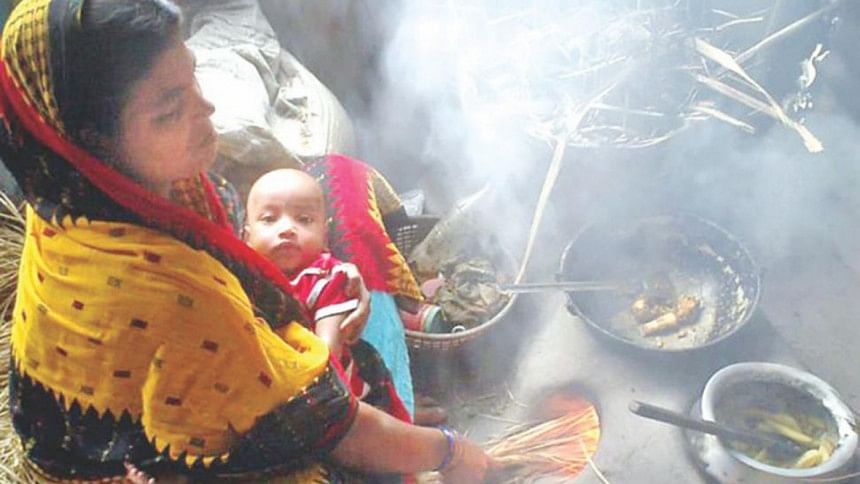A man’s share in ‘women’s work’

Society imposes different roles and responsibilities on men and women based on the gender of an individual which at times impede the development of individuals. For instance, cooking, collecting fuel (wood for fire in rural areas) and water, taking care of children, etc. are considered to be the primary responsibilities of women and girls. These activities are termed as "unpaid care work" as they are not financially compensated.
On an average, a Bangladeshi woman has to spend around 6.45 hours on unpaid care work every day in addition to her regular tasks, according to a 2017 report by The Daily Star. On the other hand, a Bangladeshi man spends only about 1.2 hours. This difference indicates that men have access to an average of 5.25 hours more than women which they can utilise by watching TV, chatting with friends or building new capacities for career development. Whereas, women are burdened solely with the above-mentioned household tasks. So how can we break the gender stereotypes imposed by society? The answer lies in what is known as a Gender Transformative Approach (GTA), which essentially changes the socially assigned roles of men and women. One of the most crucial functions of this approach is to evaluate women's unpaid care work.
According to the Global Gender Inequality Index, Bangladesh ranks 119th out of 188 countries (UNDP, 2015). This indicates that Bangladesh has a long way to go to achieve gender equality. Women's empowerment, especially their economic empowerment, could be boosted through access to, and control over, resources. Being engaged with paid productive activities is a primary condition for this process. Moreover, empowerment requires skills, training, dedicated time, mobility, resources, networking and support from family. A woman's involvement in economic activities will be hindered if the above conditions are not met. In this case, a break from household activities or task-sharing by someone else will be helpful for her. If the husband comes forward to share the tasks, it will not only add value to the career of the woman but also enhance the financial status of the family.
Bangladesh is a country where women have to shoulder the uneven burden of care work. This uneven and often unrecognised burden not only pushes women back to the private sphere but also limits their empowerment opportunities. In recent times, Bangladesh has achieved significant progress in the field of women's empowerment. A large number of women are taking part in paid economic activities and contributing to the wellbeing of their family as well as the GDP. Recent data shows that in Bangladesh, 34 percent of women are involved in the labour force whereas men's participation is 82 percent (ADB, 2016). Women's excessive burden of household tasks is one of the major reasons behind this unequal participation in the labour force. Over the course of time, it was found that women's involvement has increased both in the public and private spheres, indicating that the gender role is in fact being changed, albeit slowly. On the other hand, men's role as head of the family remains unchanged along with their share of household responsibilities of care work.
In order to ensure equal participation of women in income-generating activities and to enable them to access the benefit of equal opportunities, the Gender Transformative Approach could be an effective solution if household work is recognised as work instead of a "woman's duty", and if the workload is redistributed among family members. In a conventional social setting, household activities are not considered as work in most cases, although the estimated value of unpaid household work is between USD 69.81 and 91.03 billion (Haque, 2016). Economists claim that our GDP could be doubled if this work were counted in terms of GDP. These statistics suggest the financial importance of recognising unpaid care work as work, and this recognition could be the first step towards a Gender Transformative Approach as this will remove the stereotyped notion that domestic tasks are exclusively women's work.
On the other hand, redistribution aims to ensure that the burden of care work is more equitably distributed among men and women and different agencies including the family members. Thirdly, reduction of women's workload is another tool of the transformative approach. Men, especially husbands, can come forward to share domestic responsibilities which will reduce the burden for women. Moreover, technologies can also be used in applicable sectors to lessen women's workload. For example, rice cooker, electric oven, washing machine (depending on affordability) and so on could be used to minimise time and labour in household tasks. Even in rural areas, women are increasingly enjoying the benefits of these technological interventions. During my recent visit to a remote village near the Sundarbans, I found that a number of households are using rice cookers and such products are getting popular as they reduce women's workload.
A changed mindset is required for a successful utilisation of all these mechanisms of Gender Transformative Approach and the family should be at the centre of this change. According to the existing socialisation process, girl children are trained for household activities, including cooking food, carrying water and fuel, taking care of children and the elderly and washing clothes of the family members. On the other hand, boys are given freedom to gain skills associated with income generation such as agricultural work, carpentry, driving, formal education, etc. This is how society distinguishes the role of boys and girls. Instead of this existing practice, children could be taught that a boy can easily cook food and a girl can be trained up in a way that she can also be the earning member of the family.
In addition to family, academic institutions also have a role to play to create a society based on gender equality by following the Gender Transformative Approach. Schools have a great impact on the development of children. So if the schools can come up with changes like revising the existing gender-biased curriculum, treating male and female students equally and promoting extra-curricular activities for boys and girls alike, it would significantly boost up the gender transformative changes. Though the Gender Transformative Approach is needed to address gender inequality in all spheres of life, here the focus has been only on the unpaid care work and the socialisation process as these are the foundations of all other forms of inequality. A proper use of the tools and strategies linked with pursuing the Gender Transformative Approach in other areas of gender inequality—including gender-based violence, girls' education, natural resources management, etc.—would be an effective way to promote gender equality in Bangladesh which can bring enormous benefits to society.
SM Faridul Haque is a gender specialist.
Email: [email protected]

 For all latest news, follow The Daily Star's Google News channel.
For all latest news, follow The Daily Star's Google News channel. 



Comments